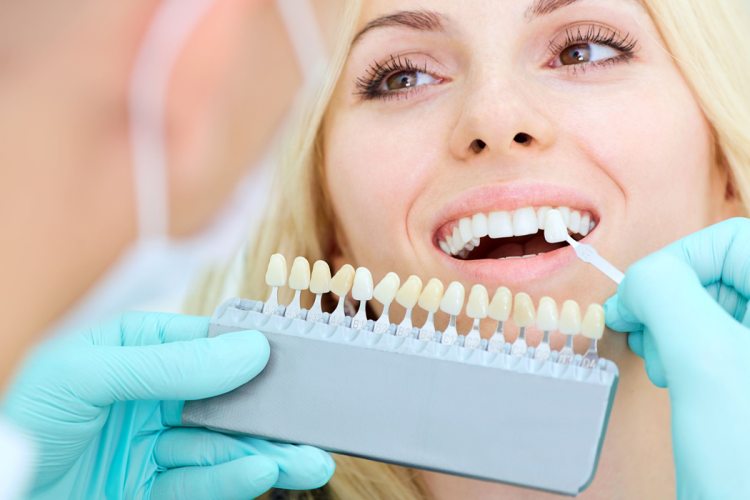If you’re facing the prospect of getting a dental crown, you probably feel a mix of emotions. A dental crown is a common procedure, but it’s natural to feel some apprehension about the process and what to expect. This article aims to demystify the dental crown procedure, providing you with a comprehensive understanding of what lies ahead.
From the initial consultation to the final fitting, this article will walk you through each step, addressing common concerns and equipping you with the knowledge you need to confidently approach your treatment. By the end, you’ll have a clear picture of what to expect, putting your mind at ease and allowing you to focus on the ultimate goal: restoring the health and functionality of your tooth.

Preparation And Diagnosis
The first step in the dental crown process is a thorough evaluation by your dentist. During this appointment, your dentist will:
- Examine The Affected Tooth: Using specialized tools and imaging techniques, your dentist will closely inspect the tooth that requires a crown. This examination helps determine the extent of the damage or decay and ensures that a crown is the most appropriate treatment option.
- Discuss Your Medical History: Your dentist will review your medical history, including any existing conditions or medications you’re taking. This information helps them identify potential risks or complications that may arise during the procedure.
- Explain The Process: Your dentist will take the time to explain the entire crown procedure, answer any questions you may have, and address your concerns. They’ll also discuss the different types of dental crowns available and help you choose the best option based on your needs and preferences.
- Take Impressions Or Digital Scans: To create a customized crown that fits perfectly, your dentist will need to take impressions or digital scans of your teeth. These molds or scans capture the precise shape and dimensions of your mouth, ensuring a comfortable and accurate fit.
By the end of this initial appointment, you’ll have a clear understanding of what to expect moving forward and can make an informed decision about proceeding with the dental crown treatment.
Tooth Preparation
Once the decision to proceed with a dental crown has been made, the next step is to prepare the affected tooth. This process is typically completed during the same appointment as the initial consultation, or it may be scheduled separately. Here’s what you can expect:
- Anesthesia Application: To ensure your comfort during the procedure, your dentist will administer a local anesthetic. This numbing agent is typically injected near the tooth being treated, allowing the area to become numb and preventing discomfort.
- Tooth Shaping: Your dentist will use specialized dental instruments to remove a thin layer of enamel from the tooth’s surface. This shaping process creates room for the crown to fit properly and ensures a secure bond between the crown and the remaining tooth structure.
- Impressions Or Digital Scans: If not already done during the initial consultation, your dentist will take impressions or digital scans of your prepared tooth and surrounding teeth. These molds or scans are then sent to a dental laboratory, where your custom crown will be fabricated.
- Temporary Crown Placement: In many cases, your dentist will place a temporary crown over the prepared tooth. This protective covering shields the exposed area and helps maintain the shape and spacing of your teeth until your permanent crown is ready.
Throughout the tooth preparation process, your dentist will ensure your comfort and answer any questions you may have. They’ll also provide you with instructions on how to care for your temporary crown and what to expect in the days leading up to your next appointment.
Permanent Crown Fabrication
While you’re wearing your temporary crown, the dental laboratory will be hard at work creating your permanent crown. This process involves the following steps:
- Design And Modeling: Using the impressions or digital scans provided by your dentist, a skilled technician will design and model your custom crown. This step ensures that the crown fits perfectly and blends seamlessly with your existing teeth.
- Material Selection: Dental crowns are available in several materials, such as porcelain, ceramic, metal alloys, or a blend of these substances. Your dentist will help you choose the material that best suits your needs, considering factors such as durability, aesthetics, and cost.
- Fabrication: Once the design and materials have been finalized, the technicians at the dental laboratory will carefully craft your permanent crown. This process may involve computer-aided design and manufacturing (CAD/CAM) technology or traditional sculpting and casting methods, depending on the materials used and the laboratory’s capabilities.
- Quality Control: Before your crown is sent back to your dentist’s office, it undergoes rigorous quality control checks. Technicians will inspect the fit, shape, and appearance of the crown to ensure it meets the highest standards.
The fabrication process can take several days or weeks, depending on the complexity of your case and the workload of the dental laboratory. Your dentist will provide you with an estimated timeline for when your permanent crown will be ready.
Permanent Crown Placement
When your custom-made crown is ready, you’ll return to your dentist’s office for the final stage of the process: the permanent crown placement. Here’s what you can expect:
- Removal Of Temporary Crown: Your dentist will carefully remove the temporary crown, exposing the prepared tooth.
- Tooth Cleaning And Preparation: The tooth surface will be thoroughly cleaned and dried to ensure a secure bond between the crown and the remaining tooth structure.
- Crown Fitting And Adjustments: Your dentist will place the permanent crown over the prepared tooth and check for proper fit, bite alignment, and comfort. If any adjustments are needed, they’ll make the necessary modifications to ensure a seamless fit.
- Cementing The Crown: Once the fit is perfect, your dentist will use a special dental cement to secure the crown in place. This cement creates a strong and durable bond between the crown and your natural tooth.
- Bite Check And Final Adjustments: After the crown is cemented, your dentist will have you bite down and check the alignment once more. Any final adjustments will be made to ensure a comfortable and functional bite.
- Care Instructions: Before you leave the office, your dentist will provide you with detailed instructions on how to care for your new crown. This may include recommendations on proper brushing and flossing techniques, as well as dietary guidelines to prolong the life of your crown.
Throughout the permanent crown placement process, your dentist will prioritize your comfort and ensure that the final result meets your expectations. They’ll also address any lingering questions or concerns you may have.
After Care And Maintenance
Once your permanent crown is in place, it’s important to follow your dentist’s aftercare instructions to ensure its longevity and maintain your oral health. Here are some tips for proper care and maintenance:
- Follow Dietary Guidelines: Your dentist may recommend avoiding certain foods or habits that could damage or dislodge your crown, at least for the first few days after placement. It’s best to avoid hard, sticky, or crunchy foods that could put excessive pressure on the crown.
- Practice Good Oral Hygiene: Proper brushing and flossing are crucial for maintaining the health of your crown and surrounding teeth. Be sure to brush twice a day and floss once daily, taking care to clean around the crown’s edges.
- Use Appropriate Dental Products: To prevent scratching or damaging the crown’s surface, your dentist might advise using a toothbrush with soft bristles and toothpaste that is not abrasive. Furthermore, they might recommend an antimicrobial mouthwash to help protect against gum disease and tooth decay.
- Attend Regular Dental Check-ups: Maintaining regular dental check-ups and cleanings is crucial, even with a crown in place. Your dentist will keep an eye on the state of your crown and ensure it’s working as it should.
- Avoid Habits That Could Damage The Crown: Habits like grinding your teeth, chewing on hard objects (like ice or pen caps), or using your teeth to open packages can put excessive stress on your crown and potentially cause damage or dislodgement.
By following these aftercare guidelines, you can help ensure that your dental crown lasts for many years, providing you with a functional and aesthetic solution for your damaged or decayed tooth.
Potential Complications And Solutions
While dental crown procedures are generally safe and effective, it’s important to be aware of potential complications that may arise. Here are some common issues and their solutions:
- Crown Discomfort Or Pain: If you experience discomfort or pain after receiving your permanent crown, it could be a sign that the crown is not fitting properly or that there is an underlying issue with the tooth or surrounding tissues. In this case, contact your dentist immediately. They may need to adjust the crown or address any underlying problems.
- Crown Loosening Or Dislodgement: Over time, it’s possible for a crown to become loose or dislodged, especially if you’ve experienced trauma to the area or if the crown was not properly cemented. If your crown becomes loose, avoid chewing on that side of your mouth and contact your dentist promptly to have the crown re-cemented or replaced.
- Tooth Decay Under The Crown: While crowns are designed to protect your tooth, decay can still occur if proper oral hygiene is not maintained. If you notice any signs of decay, such as sensitivity or discoloration around the crown, schedule an appointment with your dentist. They may need to replace the crown and address any underlying decay.
- Crown Chipping Or Fracturing: Dental crowns, particularly those made of porcelain or ceramic, can chip or fracture due to excessive force or trauma. If this occurs, contact your dentist immediately. They may be able to repair or replace the crown, depending on the extent of the damage.
- Allergic Reactions: In rare cases, some individuals may experience an allergic reaction to the materials used in their dental crown. If you experience symptoms like swelling, rash, or difficulty breathing after receiving your crown, seek medical attention immediately.
By being aware of these potential complications and addressing any issues promptly, you can help ensure the longevity and success of your dental crown treatment.
Cost Considerations
The price of a dental crown can fluctuate based on various elements, such as the material chosen for the crown, the intricacy of the procedure, and the area where you live. Here are some general cost considerations to keep in mind:
- Crown Material: Dental crowns can be made from a variety of materials, each with its own cost implications. Generally, porcelain or ceramic crowns tend to be more expensive than metal or gold crowns, while composite resin crowns are often the most affordable option.
- Dental Insurance Coverage: If you have dental insurance, your plan may cover a portion of the cost of your dental crown. Be sure to check with your insurance provider to understand your coverage and any out-of-pocket expenses you may be responsible for.
- Geographic Location: The cost of dental procedures, including crowns, can vary significantly depending on where you live. Procedures tend to be more expensive in urban or metropolitan areas compared to rural areas.
- Dentist’s Fees: Different dentists may charge varying fees for their services, even within the same geographic area. It’s always a good idea to obtain quotes from multiple dentists to ensure you’re getting a fair price.
- Additional Procedures: If your dental crown requires additional procedures, such as root canal treatment or gum surgery, these will add to the overall cost of your treatment.
While the cost of a dental crown can be a significant investment, it’s important to remember that it’s an investment in your oral health and overall well-being. Your dentist can provide you with a detailed breakdown of the costs involved and help you explore potential financing options if needed.
Conclusion
Undergoing a dental crown procedure can seem daunting, but with the right information and preparation, it can be a relatively straightforward process. By understanding what to expect at each stage, from the initial consultation to the permanent crown placement and aftercare, you can approach your treatment with confidence and ease. Remember, your dentist is there to guide you every step of the way, ensuring your comfort and addressing any concerns you may have. With proper care and maintenance, your dental crown can restore the functionality and aesthetics of your smile for years to come.





I adore versions of individual short articles. It’s going to be reasonable to discover one particular make clear throughout words and phrases from key and in many cases love within this certain crucial topic are going to be quickly seasoned.
Ready to make a positive change in your life or the life of a loved one? Our directory on Intervention offers a valuable resource for finding qualified professionals who can provide you with the support and guidance you need. With experts listed by state, you can easily find a local expert who understands the unique challenges you’re facing. Find an Interventionist here.